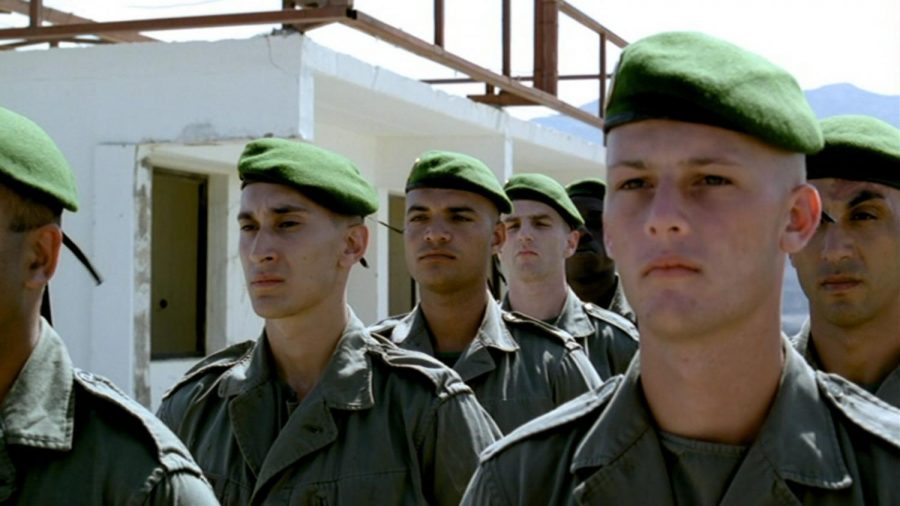Sunbaked bodies bustle under the African Sun in Claire Denis’s loose re-telling of Herman Melville’s “Billy Budd.” Under Officer Galoup’s (Denis Lavant) eyes, the aptly christened, nameless legionaries toil day-in and day-out. Living in limbo, they’re undergoing training … why? Well, no one really knows, and Claire Denis never goes out of the way to inform her audience; instead, she chooses to focus on exhausted thighs, homoerotically hellenistic abdomens, strange glances, bright blues and sandy terrain. Clocking in at 90 minutes, “Beau Travail” stands as a beautiful condensation of cinema that uses the female gaze to interrogate masculine rituals.
Shot by Agnès Godard and vividly re-animated by the restoration team over at Janus Films, the release of “Beau Travail” enlivens every single one of the film’s qualities, digging out and diffusing a visual gem that seemed to have been lost in the dunes of Djibouti.
The story that unfolds is that of jealousy, of pure, unrestrained paranoia propelling Lavant’s Galoup towards a tragic demise. Capturing every pore of Lavant’s atypically alluring face and every bead of sweat that runs down his forehead, Godard and Denis collectively manage to capture genuine frustration as Galoup begins digging himself deeper and deeper into a mental trap. There’s no escaping the concentrated madness of his voyage and Denis doesn’t let you, cutting each scene abruptly like a butcher in order to properly express those moments of obsessive monomania Galoup keeps playing over and over in his head.
There’s something comedic about historically conducted male, military conditioning appearing so aimless. Denis scrutinizes their purposeless preparation, the ridiculousness of their confrontation and their acts of macho-ness in a way that paints the legionnaires as unusually buff yet bumbling idlers stranded in the desert. They’re doing so much of nothing; it’s only a matter of time before they begin operating in the realm of invented somethings, as Officer Galoup begins to do when he convinces himself the new recruit, Gilles Sentain (Grégoire Colin), is up to no good. Under a foreign, female lens, these rituals of masculinity begin to crumble and “Beau Travail” becomes an exercise in collapse.
Cue music by composer Benjamin Britten and suddenly, simple stares and casual confrontations gain an air of absolute intensity on this insular training camp in Djibouti. A narrative of impulsion forms itself as Britten gets louder and Galoup grows colder. And, in that strange intersection of intensity, Denis decides to splice in images that convey sheer beauty. Nudes swimming freely; kids roaming the streets in the dead of night; a blurry horizon. There’s an oxymoronic quality to the film that forces viewers to contemplate whether the beauty presented on screen is overwhelming onto itself. How do these pieces fit together? They are moments of mania and impressions of liberation. The confluence is arresting, inducing a certain type of trance where viewers are caught in the same purgatory as Galoup for no particular reason, digesting projected pressures all the while consuming pictures containing immaculate beauties.
There lies Melville, in the idea of a ship, a vessel of freedom, becoming an island, and its cabinets, prisons. It’s no wonder Galoup’s going mad after living in the desert for so long; it’s just so apparent it’s almost gained a surreality. Why now? What prompted it this time? Is it the new recruit’s naiveté, a de-sensitization to the beauty that surrounds him, an ill-advised plan to escape? Questions bask in the shadows of Godard’s cinematography, allowing “Beau Travail” to unfold with a strained condition of ambiguity. A sense of direction always exists in “Beau Travail,” it’s just constantly under interrogation.
In that way, Denis achieves something remarkable in bestowing a sense of interrogation before her actors and her audience. Everyone is in the same boat, staring at the same things, subject to an internal logic that slowly unfurls and eventually explodes (but, I shall refrain from spoilers). Thus, with a sense of direction that’s constantly under questioning, all you’re left with are motifs to latch onto. In typical Denis fashion, these present themselves in the forms of bodies. To this day, no one’s been able to emulate her placement of bodies in a space in a frame — that tug-of-war between confinement and liberation. The closest anyone’s gotten has been Xavier Dolan in “Mommy,” but he had to resort to aspect ratio gimmickry whereas it somehow manifests itself in an entirely natural way for Denis. These lurching bodies encapsulate the film’s duality between deadlocked momentum and desire for catharsis, a duality that finally fractures in the film’s final moments as full body liberation is enacted before the screen.
“Beau Travail” still stands as a gem, untouched by time, composed of brilliant cuts and lustered to shine before a new audience as it did at the dawn of the millennium. Godard’s cinematography has never looked better and this restoration is yet another testament to Janus Films’ team’s ability to resuscitate art time and time again. The mental struggles Galoup endures still rings true today, taking on a new meaning in an age of drifting ambitions and derailed trajectories. As a portrait of cult and personal collapse, “Beau Travail,” radiates genius in every sparkle it manages to capture shining off a speckle of sand before the blazing heat of a summer sun.
Email Nicolas Pedrero-Setzer at [email protected].


























































































































































